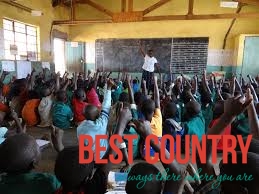Education in Malawi

Primary Education
There are two main types of primary schools, namely assisted (public) and unassisted (private) schools. Primary schools can be found in many villages and hamlets throughout Malawi. By 1970, there were approximately 2,000 primary schools for 35 percent of primary school aged youth. About 12 percent of all primary school students attended private, predominantly church run schools.
Secondary School Education
Secondary education developed late in Malawi, because of little effort or neglect in secondary education during the colonial era. Malawi has five types of secondary schools.
There are aided boarding schools, aided day schools, government boarding-secondary schools, government day secondary schools, and private secondary schools. Most secondary teachers are qualified and hold either degrees or diplomas. In the curriculum, Agriculture is a compulsory subject for all students.
Wood working, metal work, and technical drawing are encouraged for boys, and home economics is encouraged for girls. One of the biggest criticisms of secondary schools in Malawi is that they are too university-oriented and needs more technical skills taught. Most students immediately enter the workforce and need a different orientation. Therefore, Secondary schools do not produce as many graduates as the labor market demands.
Public School System
The government established free primary education for all children in 1994, which increased attendance rates, according to UNICEF. In 1994, the gross primary enrollment rate was 133.9 percent, and the net primary enrollment rate was 102.6 percent.In 1995, 62 percent of students entering primary school reached grade two, and 34 percent reached grade five. The dropout rate is higher among girls than boys.
Private School System
Private schools have risen in Malawi and offer an alternative to public schools. Private schools include school like Phungu, Lilongwe Girls, and Sunnyside School. Some consolidates private schools are run by the Designated Schools Board.